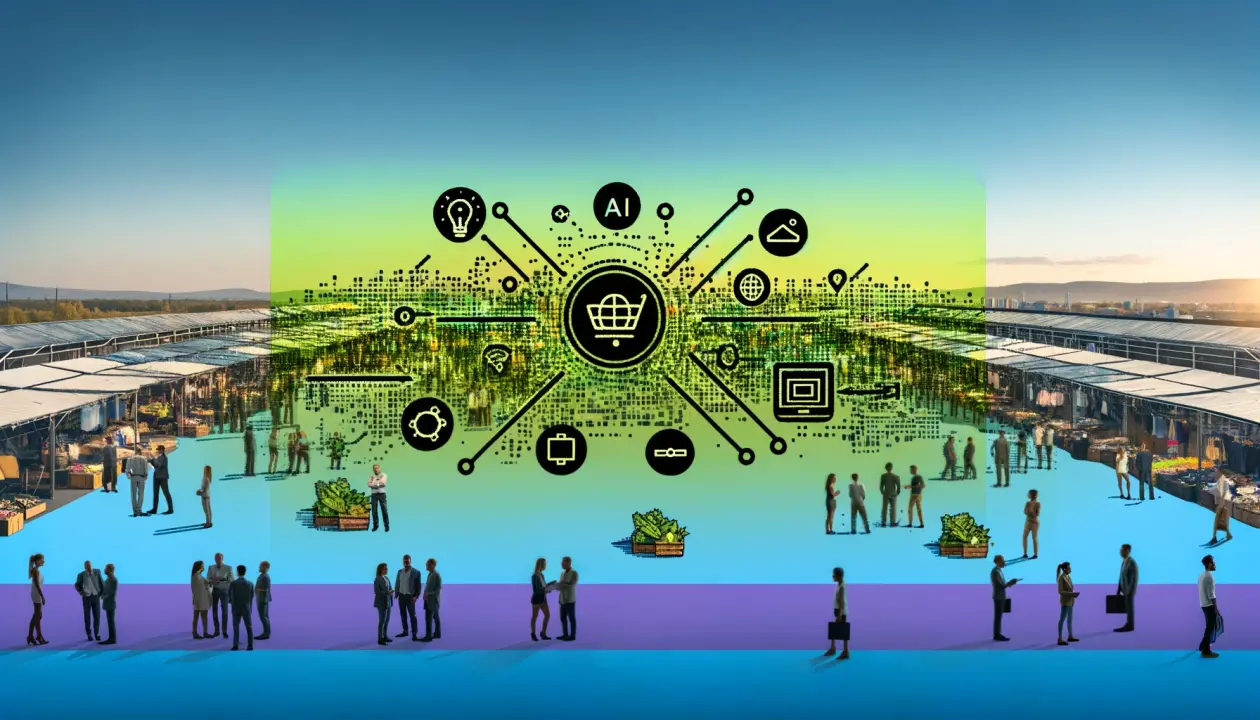The rapid advancement of technology is fundamentally transforming global markets, creating new opportunities, disrupting traditional industries, and reshaping economic landscapes. From artificial intelligence and blockchain to renewable energy and digital finance, technology’s impact on global markets is profound and multifaceted. This article explores how various technological innovations are driving changes in global markets, highlighting key trends, sectors, and future implications.
Contents
- 1 Introduction to Technological Transformation
- 2 Artificial Intelligence and Machine Learning
- 3 Automation and Efficiency
- 4 Data Analytics and Insights
- 5 Data Collection and Analysis
- 6 5G Technology
- 7 Economic Growth and Innovation
- 8 Renewable Energy Technologies
- 9 Economic Opportunities
- 10 Digital Finance and Fintech
- 11 Disruption of Traditional Financial Services
- 12 Future Implications and Strategic Considerations
Introduction to Technological Transformation
Technological innovation is a powerful force driving economic growth and market evolution. As new technologies emerge and existing ones evolve, they alter the way businesses operate, consumers behave, and economies develop. Key technological advancements influencing global markets include:
Artificial Intelligence (AI) and Machine Learning (ML)
Blockchain and Cryptocurrencies
Internet of Things (IoT)
5G Technology
Renewable Energy Technologies
Digital Finance and Fintech
Understanding these technologies and their impact on global markets is essential for investors, businesses, and policymakers aiming to harness their potential.
Artificial Intelligence and Machine Learning
Automation and Efficiency
AI and ML are transforming industries by automating processes, enhancing decision-making, and increasing efficiency. Key areas of impact include:
Manufacturing: AI-driven automation and robotics streamline production processes, reduce costs, and improve quality control.
Healthcare: AI-powered diagnostics, personalized medicine, and robotic surgery enhance patient care and outcomes.
Finance: Algorithmic trading, fraud detection, and customer service chatbots improve financial services and security.
Data Analytics and Insights
AI and ML enable advanced data analytics, providing businesses with deeper insights into consumer behavior, market trends, and operational performance. This capability allows companies to:
Optimize Marketing Strategies: Personalized marketing campaigns based on data-driven insights increase engagement and conversion rates.
Improve Supply Chain Management: Predictive analytics optimize inventory levels, reduce waste, and enhance supply chain efficiency.
Enhance Customer Experience: AI-driven customer insights enable personalized services and improved customer satisfaction.
Blockchain and Cryptocurrencies
Decentralization and Security
Blockchain technology offers a decentralized and secure way to record transactions, providing transparency and reducing the risk of fraud. Key applications include:
Cryptocurrencies: Digital currencies like Bitcoin and Ethereum enable secure, peer-to-peer transactions without intermediaries.
Smart Contracts: Blockchain-based contracts automatically execute terms when predefined conditions are met, reducing the need for intermediaries.
Supply Chain Management: Blockchain enhances traceability, transparency, and security in supply chains, from raw materials to end products.
Financial Inclusion
Blockchain and cryptocurrencies promote financial inclusion by providing access to financial services for unbanked and underbanked populations. Key benefits include:
Cross-Border Payments: Cryptocurrencies facilitate fast, low-cost international transactions, benefiting remittances and global trade.
Decentralized Finance (DeFi): DeFi platforms offer financial services like lending, borrowing, and investing without traditional banks, increasing accessibility and inclusivity.
Internet of Things (IoT)
Connectivity and Automation
The IoT connects devices and systems, enabling real-time data exchange and automation across various sectors. Key impacts include:
Smart Homes and Cities: IoT-enabled smart devices enhance home automation, energy efficiency, and urban infrastructure management.
Industrial IoT (IIoT): Connected sensors and devices in industrial settings improve monitoring, maintenance, and operational efficiency.
Healthcare: IoT-enabled medical devices and wearables monitor patient health in real-time, improving diagnosis and treatment.
Data Collection and Analysis
IoT generates vast amounts of data, which can be analyzed to derive actionable insights. Key applications include:
Predictive Maintenance: IoT sensors monitor equipment health, predicting failures and reducing downtime.
Energy Management: Smart grids and energy management systems optimize energy consumption and reduce costs.
Agriculture: IoT devices monitor soil conditions, weather, and crop health, enhancing agricultural productivity and sustainability.
5G Technology
Enhanced Connectivity and Speed
5G technology provides faster, more reliable internet connections, enabling new applications and services. Key impacts include:
Mobile Connectivity: Faster data speeds and lower latency enhance mobile internet experiences, supporting high-quality streaming, gaming, and communication.
IoT Expansion: 5G supports a higher density of connected devices, driving the growth of IoT applications in various sectors.
Remote Work and Education: Enhanced connectivity supports remote work, online education, and telehealth services, transforming work and learning environments.
Economic Growth and Innovation
5G technology stimulates economic growth by enabling new business models, services, and industries. Key opportunities include:
Autonomous Vehicles: 5G connectivity supports real-time data exchange, enabling safer and more efficient autonomous vehicles.
Smart Manufacturing: 5G-powered industrial automation and robotics enhance manufacturing processes and productivity.
Augmented and Virtual Reality (AR/VR): 5G enables high-quality AR/VR applications in gaming, education, healthcare, and entertainment.
Renewable Energy Technologies
Sustainability and Climate Impact
Technological advancements in renewable energy are transforming the energy sector, promoting sustainability and reducing carbon emissions. Key technologies include:
Solar and Wind Energy: Innovations in solar panels and wind turbines improve efficiency, scalability, and affordability.
Energy Storage: Advanced batteries and storage solutions enhance the reliability and integration of renewable energy sources.
Smart Grids: Smart grid technologies optimize energy distribution, balancing supply and demand and integrating renewable energy.
Economic Opportunities
The transition to renewable energy creates economic opportunities in various sectors. Key areas of growth include:
Clean Energy Investments: Investments in renewable energy projects drive economic growth and job creation.
Green Technologies: Development and deployment of green technologies support sustainable industries and practices.
Climate Finance: Financial instruments like green bonds fund sustainable projects, attracting ESG-focused investors.
Digital Finance and Fintech
Financial Innovation and Inclusion
Fintech innovations are revolutionizing the financial sector, enhancing accessibility, efficiency, and customer experience. Key areas of impact include:
Digital Banking: Online banks and digital financial services provide convenient and accessible banking solutions.
Mobile Payments: Mobile payment platforms enable seamless, secure transactions, driving the growth of digital commerce.
Robo-Advisors: AI-powered robo-advisors offer personalized investment advice and portfolio management, democratizing wealth management.
Disruption of Traditional Financial Services
Fintech disrupts traditional financial services, introducing competition and driving innovation. Key developments include:
Peer-to-Peer Lending: P2P lending platforms connect borrowers and lenders directly, offering competitive rates and flexible terms.
Insurtech: Innovations in insurance technology streamline processes, enhance customer experience, and introduce new products.
Regtech: Regulatory technology solutions help financial institutions comply with regulations, reduce costs, and enhance transparency.
Future Implications and Strategic Considerations
Embracing Technological Change
To harness the potential of technological advancements, businesses, investors, and policymakers must embrace change and innovation. Key strategies include:
Investing in R&D: Continued investment in research and development drives technological innovation and competitive advantage.
Fostering Collaboration: Collaboration between governments, businesses, and research institutions accelerates technological progress and adoption.
Developing Skills: Investing in education and training programs ensures a skilled workforce capable of leveraging new technologies.
While technology offers immense opportunities, it also presents risks and challenges that must be addressed. Key considerations include:
Cybersecurity: Ensuring robust cybersecurity measures to protect data and systems from cyber threats.
Regulatory Compliance: Navigating complex regulatory environments to ensure compliance and avoid legal risks.
Ethical Considerations: Addressing ethical concerns related to AI, data privacy, and the societal impact of technological advancements.
Technology is a driving force shaping global markets, creating new opportunities and challenges for businesses, investors, and policymakers. From AI and blockchain to renewable energy and fintech, technological advancements are transforming industries, enhancing efficiency, and promoting sustainability. By understanding and embracing these changes, stakeholders can harness the potential of technology to drive economic growth, innovation, and global market development.


